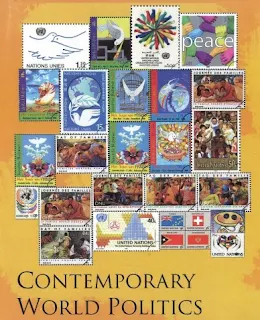 |
| Contemporary World Politics |
DESCRIPTION:
The realm of contemporary
world politics is a dynamic and intricate tapestry of states, international
organizations, non-state actors, and global issues. It is a landscape where the
struggle for power, the quest for peace, and the pursuit of common interests
intersect and shape the course of human history. In this 2000-word exploration,
we will delve into the key dimensions, challenges, and dynamics of contemporary
world politics.
I. The Post-Cold War Era: A
New World Order
The end of the Cold War in the
early 1990s marked a watershed moment in contemporary world politics. With the
collapse of the Soviet Union, the bipolar structure of the international system
gave way to a unipolar one, with the United States emerging as the dominant
global superpower. This period witnessed significant changes in the dynamics of
world politics:
1. Globalization:
Advances in technology, communication, and trade facilitated the globalization
of economies, cultures, and information. The interconnectedness of the modern
world reshaped international relations, creating new opportunities and
challenges.
2. Rise of Non-State Actors:
Non-governmental organizations (NGOs), multinational corporations, and
transnational criminal organizations gained prominence, influencing global
politics and complicating state-centric diplomacy.
3. Regional Conflicts: Ethnic
and religious tensions led to conflicts in various regions, from the Balkans to
the Middle East, with the international community grappling to find solutions
to these complex disputes.
4. Humanitarian Intervention: The
international community confronted questions about the ethics and effectiveness
of humanitarian interventions, notably in cases like Kosovo, Rwanda, and East
Timor.
II. The Unipolar Moment:
American Hegemony
The post-Cold War era was
characterized by American hegemony and the projection of U.S. power across the
globe. This period was marked by various developments:
1. American Foreign Policy: The
United States, as the lone superpower, played a central role in shaping global
politics. Its foreign policy decisions, such as the intervention in Iraq,
became defining moments in contemporary world politics.
2. Economic Dominance: The
U.S. exerted significant influence over international financial institutions,
promoting economic policies that shaped the global economic landscape.
3. Global Security Challenges: The
war on terror, ignited by the 9/11 attacks, ushered in a new era of global
counterterrorism efforts and the U.S. invasions of Afghanistan and Iraq.
III. Multipolarity and the
Shifting Balance of Power
The unipolar moment was not
meant to last. The rise of new global powers, including China, Russia, and
regional actors like India and Brazil, signaled a shift toward multipolarity in
world politics. These developments introduced a new set of dynamics and
challenges:
1. The Rise of China:
China's rapid economic growth and military expansion positioned it as a major
player on the world stage. Its Belt and Road Initiative (BRI) aimed to
establish a global economic network, challenging traditional Western dominance.
2. Russia's Resurgence:
Russia, under Vladimir Putin's leadership, sought to regain its influence in
the international arena. The annexation of Crimea and Russia's involvement in
Syria underscored its assertive foreign policy.
3. The European Union: The
EU faced both internal and external challenges, including Brexit, the Eurozone
crisis, and the influx of refugees. Nevertheless, it continued to be a
significant player in international diplomacy and trade.
4. Regional Hotspots: Conflicts
and tensions persisted in various regions, including North Korea's nuclear
ambitions, the South China Sea dispute, and the enduring Israel-Palestine
conflict.
IV. Global Issues and
Challenges
Contemporary world politics is
intertwined with an array of pressing global issues that demand attention and
cooperation. Some of the key challenges include:
1. Climate Change: The
existential threat of climate change requires global cooperation and action.
The Paris Agreement aimed to address this issue but faces challenges in
implementation.
2. Global Health: The
COVID-19 pandemic revealed the interdependence of states and the necessity of
collaborative efforts in addressing global health crises.
3. Migration and Displacement:
Ongoing conflicts, economic disparities, and climate change have led to
significant migratory movements, challenging the international community's
capacity to manage and respond effectively.
4. Technology and
Cybersecurity: Rapid technological advancements have
introduced new dimensions to international politics, including cyberattacks,
data privacy, and artificial intelligence.
V. Global Governance and
International Organizations
The management of contemporary
world politics is influenced by a variety of international organizations and
institutions, each with its own mandates and purposes:
1. United Nations (UN): The
UN remains the central forum for diplomacy, peacekeeping, and development. Its
agencies address a wide range of global challenges, from health and education
to peace and security.
2. International Monetary Fund
(IMF) and World Bank: These institutions provide financial
assistance, promote economic stability, and work to reduce global poverty.
3. World Trade Organization
(WTO): The WTO facilitates global trade negotiations and dispute
resolution, striving to maintain an open and fair trading system.
4. Regional Organizations:
Regional bodies like the European Union, African Union, and ASEAN play crucial
roles in addressing regional issues and fostering cooperation among member
states.
VI. Diplomacy and Conflict
Resolution
Contemporary world politics
necessitates effective diplomacy and conflict resolution mechanisms to address
international disputes:
1. Diplomatic Initiatives:
Diplomatic negotiations are vital in managing tensions, settling conflicts, and
promoting cooperation. The Iran Nuclear Deal and the Korean Peninsula
negotiations are examples of such efforts.
2. Peacekeeping Operations:
United Nations peacekeeping missions are deployed to regions experiencing
conflicts, helping to maintain ceasefires, provide humanitarian aid, and
rebuild societies.
3. Mediation and Arbitration:
International organizations, governments, and non-governmental actors often
play mediating roles in conflicts, working to bring warring parties to the
negotiating table.
VII. Human Rights and Ethics
Contemporary world politics is
deeply concerned with human rights and ethical considerations:
1. Genocide and Atrocities: The
international community has grappled with preventing and responding to
instances of genocide and crimes against humanity, with the establishment of
the International Criminal Court (ICC) being a significant development.
2. Humanitarian Action:
Humanitarian organizations provide aid and support to populations affected by
conflicts and natural disasters, adhering to principles of neutrality,
impartiality, and independence.
3. Responsibility to Protect
(R2P): The R2P doctrine underscores the international community's
responsibility to prevent mass atrocities and protect vulnerable populations
when states fail to do so.
VIII. Challenges to Global
Order
Contemporary world politics is
not without challenges to the global order. These challenges are multifaceted
and include:
1. Nationalism and Populism: The
rise of nationalist and populist leaders in various countries has raised
questions about the durability of international cooperation and institutions.
2. Cybersecurity Threats: As
technology advances, state and non-state actors engage in cyberattacks and
espionage, posing new security threats.
3. Terrorism:
Terrorist groups, such as ISIS, Al-Qaeda, and Boko Haram, continue to
destabilize regions and provoke international responses.
IX. The Role of Soft Power
In contemporary world
politics, the role of soft power—cultural, economic, and diplomatic
influence—has become increasingly significant. Countries like the United States
and China leverage soft power to shape international perceptions and build
relationships.
X. The Future of World
Politics
The future of contemporary
world politics is uncertain but undoubtedly marked by evolving dynamics,
challenges, and opportunities. Key areas of focus include:
1. Great Power Competition: The
rivalry between the United States, China, and other emerging powers will
continue to shape global politics, influencing economic, military, and
technological developments.
2. Climate Action: The
need for urgent action on climate change will remain a central issue, requiring
international cooperation and commitment to sustainability.
3. Technology: Advancements
in artificial intelligence, cybersecurity, and biotechnology will introduce new
challenges and ethical considerations to international politics.
4. Pandemics and Global
Health: The experience of the COVID-19 pandemic has underscored
the importance of global health cooperation and preparedness.
Conclusion: A Dynamic and
Evolving Landscape
Contemporary world politics is
a constantly evolving and complex terrain. It reflects the shifting dynamics of
power, the challenges of globalization, and the imperative for international
cooperation. Understanding and navigating this landscape is essential for
addressing the pressing global issues of our time and shaping a more peaceful,
just, and sustainable future for the world.
